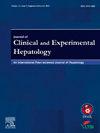肝硬化和严重血小板减少症高危手术患者按需输血策略与预防性血小板输注的安全性和结果:两项随机对照试验的事后分析
IF 3.3
Q2 GASTROENTEROLOGY & HEPATOLOGY
Journal of Clinical and Experimental Hepatology
Pub Date : 2024-11-30
DOI:10.1016/j.jceh.2024.102467
引用次数: 0
摘要
背景:目前关于高风险手术前预防性血小板输注是否能降低肝硬化患者出血风险的研究有限。方法:我们对先前的两项随机临床试验(CTRI/2017/12/010822和CTRI/2021/05/033464)进行事后分析,将血栓弹性成像引导的预防性血小板输注与标准护理(术前所有患者的经验性预防性输血)或按需输血(无预防性输血)进行比较。我们的目的是评估接受预防性血小板输注与未接受血小板输注(按需输注)的患者发生重大手术相关出血或死亡的风险。结果:共有118例患者纳入分析,组间基线人口统计学吻合良好。肝硬化的主要病因是隐源性(42.35.6%)和自身免疫性肝病(30.25.4%)。最常见的手术是经皮肝活检(73,61.8%),其次是经颈静脉肝内门静脉分流术(14.11.9%)和经动脉化疗栓塞术(14.11.9%)。两组均未发生大出血或手术相关死亡,但有5例患者发生轻微出血。按需输血组中需要血小板输注的患者数量明显低于接受经验性输注作为标准护理一部分的患者。结论:在接受高危手术的肝硬化患者中,不进行预防性血小板输注的患者与接受血小板输注的患者相比,手术相关出血发生率没有显著升高。需要更大规模的随机试验来验证我们事后分析的发现。本文章由计算机程序翻译,如有差异,请以英文原文为准。
Safety and Outcomes of an On-Demand Transfusion Strategy Versus Prophylactic Transfusion of Platelets in Patients With Liver Cirrhosis and Severe Thrombocytopenia Undergoing High-Risk Procedures: A Post Hoc Analysis of Two Randomized Controlled Trials
Background
There are limited studies assessing whether prophylactic platelet transfusions prior to high-risk procedures reduce the risk of bleeding in patients with liver cirrhosis.
Methods
We performed a post hoc analysis of two prior randomized clinical trials (CTRI/2017/12/010822 and CTRI/2021/05/033464), which compared thromboelastography-guided prophylactic platelet transfusion to standard-of-care (empirical prophylactic transfusion for all patients prior to the procedure) or on-demand transfusion (no prophylactic transfusions). We aimed to assess the risk of major procedure-related bleeding or mortality among patients who had received prophylactic platelet transfusions versus those who did not (on-demand transfusions).
Results
A total of 118 patients were included in the analysis, with baseline demographics well matched between groups. The leading etiologies of cirrhosis were cryptogenic (42, 35.6%) and autoimmune liver disease (30, 25.4%). The most common procedures performed were percutaneous liver biopsy (73, 61.8%), followed by transjugular intrahepatic portosystemic shunt (14, 11.9%) and transarterial chemoembolization (14, 11.9%). No episode of major bleeding or procedure-related mortality occurred in either group, though minor bleeding occurred in 5 patients. A significantly lower number of patients in the on-demand group required platelet transfusions than those receiving empirical transfusions as part of standard care.
Conclusion
Procedure-related bleeding rates were not significantly higher among patients with liver cirrhosis undergoing high-risk procedures without prophylactic platelet transfusions than in those who received them. Larger randomized trials are required to validate these findings from our post hoc analysis.
求助全文
通过发布文献求助,成功后即可免费获取论文全文。
去求助
来源期刊

Journal of Clinical and Experimental Hepatology
GASTROENTEROLOGY & HEPATOLOGY-
CiteScore
4.90
自引率
16.70%
发文量
537
审稿时长
64 days
 求助内容:
求助内容: 应助结果提醒方式:
应助结果提醒方式:


